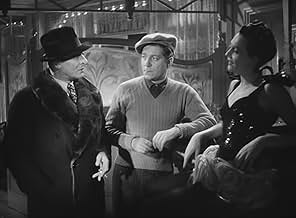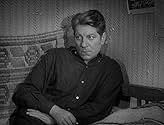Le jour se lève
- 1939
- Tous publics
- 1h 33min
NOTE IMDb
7,7/10
8,7 k
MA NOTE
Après avoir commis un meurtre, un homme s'enferme dans son appartement et se souvient des événements qui l'ont conduit au meurtre.Après avoir commis un meurtre, un homme s'enferme dans son appartement et se souvient des événements qui l'ont conduit au meurtre.Après avoir commis un meurtre, un homme s'enferme dans son appartement et se souvient des événements qui l'ont conduit au meurtre.
- Réalisation
- Scénario
- Casting principal
- Récompenses
- 1 nomination au total
René Génin
- Le concierge
- (as Genin)
Arthur Devère
- Mr. Gerbois
- (as Arthur Devere)
René Bergeron
- Le patron du café
- (as Bergeron)
Marcel Pérès
- Paulo
- (as Peres)
Annie Cariel
- Une locataire
- (non crédité)
Georges Douking
- L'aveugle
- (non crédité)
Georges Gosset
- Un agent
- (non crédité)
Avis à la une
We see a man shot; who he is and why we don't know. The murderer has locked himself inside his room. Police are forced to shoot in, trying to get him to surrender. The story then proceeds in flashback.
Marcel Carné directs this famous French film starring Jean Gabin. The two had worked together the previous year on "Le quai des brumes", a film well known then and now. If you are unfamiliar with Gabin, he was to the late 1930's in France what Bogey would be shortly in America, only Bogey with a soupçon of Cagney. More animated than Bogart, but less than Cagney with his agile song-and-dance-man side. A tough guy who's actually a good guy.
Now, a soft-hearted tough guy who's surrounded by police -- that could also describe Bogart's breakthrough film, "High Sierra", from 1941, and perhaps there is some superficial similarity.
However, this story is mostly a tale of love affairs and working class life -- that's really where its interest lies. There's a real sympathy here for the common man, when even a modest house on a rutted street would seem beyond his reach.
This film's original reputation may have been based at least in part on its Gallic openness about sexual matters. It's quite outré by the Anglo-Saxon standards of 1939. Regardless, the justly celebrated "Le jour se lève" has a poetic quality overall, and a memorably ironic final shot of the kind we don't seem to see quite often enough anymore.
Marcel Carné directs this famous French film starring Jean Gabin. The two had worked together the previous year on "Le quai des brumes", a film well known then and now. If you are unfamiliar with Gabin, he was to the late 1930's in France what Bogey would be shortly in America, only Bogey with a soupçon of Cagney. More animated than Bogart, but less than Cagney with his agile song-and-dance-man side. A tough guy who's actually a good guy.
Now, a soft-hearted tough guy who's surrounded by police -- that could also describe Bogart's breakthrough film, "High Sierra", from 1941, and perhaps there is some superficial similarity.
However, this story is mostly a tale of love affairs and working class life -- that's really where its interest lies. There's a real sympathy here for the common man, when even a modest house on a rutted street would seem beyond his reach.
This film's original reputation may have been based at least in part on its Gallic openness about sexual matters. It's quite outré by the Anglo-Saxon standards of 1939. Regardless, the justly celebrated "Le jour se lève" has a poetic quality overall, and a memorably ironic final shot of the kind we don't seem to see quite often enough anymore.
There is something so lyrical about the tale of the doomed François portrayed by the great Jean Gabin that even in its hardest luck moments you feel you are watching poetry in motion.
In addition, Le Jour se Leve is a character study with all the contradictions that tend to go with pained souls like François' - except that there is a further depth that renders the film quite universal, a depth made of little moments in human relationships and the flaws that gently emerge but only renders the humans involved more endearing.
Still, all that glitters is not gold: the apparently pure Françoise has actually been bedded by M. Valentin (Berry); and the police are more interested in getting their man than in saving him.
The direction is precise and inspired, resorting to the then much used flashback technique but never allowing it to dominate the film.
The photography - well, it is gorgeous and it gives the film its expressionistic ambiance. Finally, Gabin - one of the greatest actors ever in one of his greatest roles. Need one say more?
The ending can be predicted from the moment François kills a visitor in his apartment but that aside it is a film full of cinematographic treasures, acting to gape at, and a quality of direction that is seldom seen these days. A must see for anyone who cares about movies.
In addition, Le Jour se Leve is a character study with all the contradictions that tend to go with pained souls like François' - except that there is a further depth that renders the film quite universal, a depth made of little moments in human relationships and the flaws that gently emerge but only renders the humans involved more endearing.
Still, all that glitters is not gold: the apparently pure Françoise has actually been bedded by M. Valentin (Berry); and the police are more interested in getting their man than in saving him.
The direction is precise and inspired, resorting to the then much used flashback technique but never allowing it to dominate the film.
The photography - well, it is gorgeous and it gives the film its expressionistic ambiance. Finally, Gabin - one of the greatest actors ever in one of his greatest roles. Need one say more?
The ending can be predicted from the moment François kills a visitor in his apartment but that aside it is a film full of cinematographic treasures, acting to gape at, and a quality of direction that is seldom seen these days. A must see for anyone who cares about movies.
French cinema at its best. Ideas of freedom, entrapment, isolation and realism wound into a great film which is carried by Gabin from the opening scene of the murder, through flashbacks he has remembered to the amazingly brutal final shot. Gabin and Laurent in the factory near the beginning of the movie is poetic realism at its most involving.
A fantastic film, which plays with the emotions of the spectator while stunningly portraying the feelings of a pent-up man whose end echoes his pent-up life in the city. The film is beautifully shot in black and white and is a perfect example of French realism, with a modernist time disorientation tossed in for good measure. I found the performances by Jean Gabin and a showgirl with whom he gets involved (played by Arletty)to be strong, portrayed with a kind of hopeless, clutching pathos. Worth it simply for the beautifully constructed final shot.
Carne and Prevert on a roll; hot on the heels of 'Quai des Brumes' comes this, next up will be Les Visiteurs du Soir' and THAT will be followed by 'Les Enfants du Paradis'. Get out of that, John Ford/Dudley Nichols. Where do you start with something like this, someone send a Runner for a new set of superlatives. Start with the heavy? Jules Berry, they don't come any oilier, he'd already scored in a previous Prevert script, 'Le Crime du Monsieur Lange' with Renoir on bullhorn and he used this as a warm-up for his Satan in 'Visiteurs'. Arletty? Garance-in-Waiting, 'Hotel du Nord' behind her, 'Visiteurs/Enfants' to follow. Gabin? What can I say. Even Nat Cole didn't have a trio like this. To quote the title of an earlier (1935) Gabin vehicle this was truly La Belle Equipe. How Hollywood could cast Hank Fonda in the Gabin role is beyond me. Hank, 'aw shucks' Fonda, niceness personified as decent but RUGGED Gabin? Come on, already. Vincent Price plays Jules Berry? Get real! Sandy Trauner's brilliant apartment building sets the tone here from frame #1. What an opening, Jules Berry exiting Gabin's room and running out of breath. Crowd assembling. Nowhere-To-Go Gabin holed up in his 10 by 6 reminiscing in Gitane time. Never had a chance, life's a bitch and then you die. Basically that's all there is to it. But, as someone once said, it's the way you tell them. Brilliant in spades.
Le saviez-vous
- AnecdotesWhile not the first film to use dissolves to represent flashbacks, it was considered too new a method in the language of cinema that its producers' insisted on pre-title cards to avoid any confusion.
- Citations
M. Valentin: You're the type women fall in love with . . . I'm the type that interests them.
- ConnexionsFeatured in Un compositeur pour le cinéma: Maurice Jaubert (1985)
Meilleurs choix
Connectez-vous pour évaluer et suivre la liste de favoris afin de recevoir des recommandations personnalisées
- How long is Daybreak?Alimenté par Alexa
Détails
Box-office
- Montant brut aux États-Unis et au Canada
- 35 321 $US
- Week-end de sortie aux États-Unis et au Canada
- 11 864 $US
- 16 nov. 2014
- Montant brut mondial
- 35 321 $US
- Durée
- 1h 33min(93 min)
- Couleur
- Rapport de forme
- 1.37 : 1
Contribuer à cette page
Suggérer une modification ou ajouter du contenu manquant






















